A huge way to reduce our environmental impact is to reduce our meat consumption! Meat production accounts for about 10% of all greenhouse gas emissions. If we reduce our meat consumption, we can make a difference for the environment! A good alternative for the meat lover is plant based meat! With the increase of plant based “meat” in stores and restaurants, many people are probably wondering… if it’s not meat, but it looks like meat… and it tastes kind of like meat… what is it?? The short answer to that question is, well, plants. The two main components in animal meat are muscle and highly saturated fat – two things that plants do not have. So how can plants taste and look like meat?
Vegan Meat Characteristics
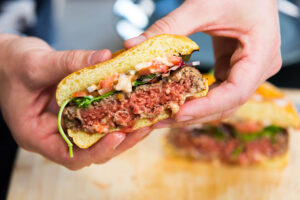 Classic meat texture, appearance, and taste are the three things vegan meat producers are trying to achieve in their plant based meats (NYT). The texture comes from a lot of research to identify specific plant proteins (pea, wheat, soy, potato) that are a close resemblance to animal proteins and can be “shaped” into meat form. Since plants contain little to no saturated fats, they have used coconut oil, one of the only solid plant fats, to replicate that of animal fat. Fake meats also usually contain added flavouring, natural or artificial (just like 90% of other groceries at the supermarket, including some classic beef burgers). Especially in a burger, people are expecting a little redness inside. Beyond Meat use beet extracts to colour their burgers, and Impossible Foods uses an iron-containing compound called leghemoglobin – an oxygen transport molecule found in legumes. This compound is said to have a “meaty flavour” just like that of myoglobin in meat.
Classic meat texture, appearance, and taste are the three things vegan meat producers are trying to achieve in their plant based meats (NYT). The texture comes from a lot of research to identify specific plant proteins (pea, wheat, soy, potato) that are a close resemblance to animal proteins and can be “shaped” into meat form. Since plants contain little to no saturated fats, they have used coconut oil, one of the only solid plant fats, to replicate that of animal fat. Fake meats also usually contain added flavouring, natural or artificial (just like 90% of other groceries at the supermarket, including some classic beef burgers). Especially in a burger, people are expecting a little redness inside. Beyond Meat use beet extracts to colour their burgers, and Impossible Foods uses an iron-containing compound called leghemoglobin – an oxygen transport molecule found in legumes. This compound is said to have a “meaty flavour” just like that of myoglobin in meat.
Burgers – The Most Popular “Meat”
As previously mentioned, Beyond Meat and Impossible Foods are the two most common plant based burgers and are already in many restaurants, grocery stores and fast food places. With so many ingredients, processing is a huge portion of making the “meat.” In reality, it is just vegetarian junk/fast food. It is arguably no healthier than a regular hamburger as they usually contain more carbs, and are similar in calories and fats. The main benefits are that eating plant based burgers is more sustainable for the environment, adds no cholesterol to the meal, and now gives vegetarians a chance to have a cheat day.
Here is how Beyond Meat makes their burgers look and taste like meat:
“Protein, fat, minerals, carbohydrates, and water are the five building blocks of meat. We source these building blocks directly from plants. Using heating, cooling, and pressure, we create the fibrous texture of meat from plant-based proteins. Then, we mix in fats, minerals, fruit and vegetable-based colours, natural flavours, and carbohydrates to replicate the appearance, juiciness, and flavour of meat. The result? Uncompromisingly delicious plant-based [meats], no sacrifice required.”
Below are the ingredients and info on these two burgers, compared with a regular beef burger.
Beyond Meat Burger: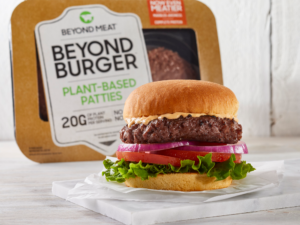
“Water, Pea Protein Isolate, Expeller-Pressed Canola Oil, Refined Coconut Oil, Rice Protein, Natural Flavours, Cocoa Butter, Mung Bean Protein, Methylcellulose, Potato Starch, Apple Extract, Salt, Potassium Chloride, Vinegar, Lemon Juice Concentrate, Sunflower Lecithin, Pomegranate Fruit Powder, Beet Juice Extract (for colour)”
The protein in this burger comes from rice, peas and mung beans, and the fat comes from canola oil, coconut oil and cocoa butter. Instead of using an egg to bind, an additive called methylcellulose is used. This binding agent is also commonly used in ice cream, jams and sauces. It is made without GMOs, soy or gluten.
A 4 ounce serving of the Beyond Burger provides Calories: 250; Total Fat: 18g; Saturated Fat: 6g; Protein: 20g; Total Carbs: 3g; Fibre: 2g; Sodium: 390mg
Impossible Burger
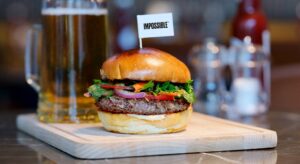 “Water, Soy Protein Concentrate, Coconut Oil, Sunflower Oil, Natural Flavours, 2% or less of: Potato Protein, Methylcellulose, Yeast Extract, Cultured Dextrose, Food Starch Modified, Soy Leghemoglobin, Salt, Soy Protein Isolate, Mixed Tocopherols (Vitamin E), Zinc Gluconate, Thiamine Hydrochloride (Vitamin B1), Sodium Ascorbate (Vitamin C), Niacin, Pyridoxine Hydrochloride (Vitamin B6), Riboflavin (Vitamin B2), Vitamin B12.”
“Water, Soy Protein Concentrate, Coconut Oil, Sunflower Oil, Natural Flavours, 2% or less of: Potato Protein, Methylcellulose, Yeast Extract, Cultured Dextrose, Food Starch Modified, Soy Leghemoglobin, Salt, Soy Protein Isolate, Mixed Tocopherols (Vitamin E), Zinc Gluconate, Thiamine Hydrochloride (Vitamin B1), Sodium Ascorbate (Vitamin C), Niacin, Pyridoxine Hydrochloride (Vitamin B6), Riboflavin (Vitamin B2), Vitamin B12.”
Impossible Foods created a plant-based heme (an iron-containing molecule that occurs naturally in every living plant and animal) through the fermentation of genetically engineered yeast, which is explained here. It’s an excellent source of most of the B-vitamins and zinc, and a good source of calcium, potassium, and phosphorus. The protein sources include soy and potato, fat comes from coconut oil and sunflower oil, while the binding agent used is methylcellulose (just like Beyond Burger).
A 4 ounce serving of the Impossible Burger provides Calories: 240; Total Fat: 14g; Saturated Fat: 8g; Protein: 19g; Total Carbs: 9g; Fibre: 3g; Sodium: 370mg.
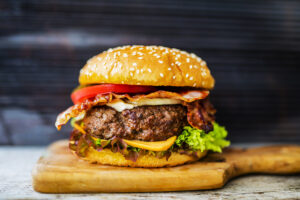
M&M Classic Beef Burger
“Beef, Water, Toasted Wheat Crumbs, Pea Protein, Salt, Modified Corn Starch, Spices And Spice Extracts, Flavour, Hydrolyzed Corn Protein, Onion Powder, Garlic Powder, Paprika Extract.”
A 4 ounce serving of the M&M Classic Beef Burger provides Calories: 310; Total Fat: 25g; Saturated + Trans Fat: 9g; Protein: 15g; Cholesterol: 65mg (22%DV); Total Carbs: 6g; Fibre: 0g; Sodium: 500mg
Cautions and Concerns
 It is known that some plant based meats contain some chemicals that you may rather not have in your body, but it is important to read the ingredients list and look up ingredients you may not recognize. This is a good recommendation for all the foods you eat, not just plant based products, as many common processed foods can contain chemicals as well. If you’re worried about switching from processed meats to plant based processed “meats” because of additives, you should be checking the ingredients lists of other common things you eat too. Some chemicals that can be found in plant based meats are as follows: Tertiary Butylhydroquinone, Magnesium Carbonate, Erythosine (Red #3), Propylene Glycol, and Ferric Orthophosphate. The Beyond Meat burger and Impossible burger are free from these ingredients.
It is known that some plant based meats contain some chemicals that you may rather not have in your body, but it is important to read the ingredients list and look up ingredients you may not recognize. This is a good recommendation for all the foods you eat, not just plant based products, as many common processed foods can contain chemicals as well. If you’re worried about switching from processed meats to plant based processed “meats” because of additives, you should be checking the ingredients lists of other common things you eat too. Some chemicals that can be found in plant based meats are as follows: Tertiary Butylhydroquinone, Magnesium Carbonate, Erythosine (Red #3), Propylene Glycol, and Ferric Orthophosphate. The Beyond Meat burger and Impossible burger are free from these ingredients.
Healthier Than Meat?
Plant-based meats do not contain any cholesterol, they are generally lower in sodium, and they have a little bit of fibre (meat does not have any). At the end of the day, they aren’t that much healthier than meat. “But they’re made of vegetables!” one could argue. Because of how they are made, they go through a lot of processing and to try to replicate flavour and appearance, there are many additives in the form of flavouring. Natural flavouring and artificial flavouring can have the same chemical formula, but one is derived straight from foods and one is artificially created. You can read more about flavouring here. But because of this, they aren’t super healthy. They are just the vegetarian form of an animal burger, which also isn’t very healthy.
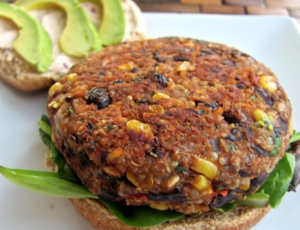 If you’re searching for a veggie burger that is healthier, a good start is one that looks like a veggie burger, packed with beans, corn, and other vegetables, but it’s still important to read the ingredients and nutrition facts. The alternative is to make your own at home. Just a reminder that these veggie burgers will not taste or look like meat, but they are better for your health and the environment. Other meat substitutes include beans and chickpeas – basically anything with a high source of protein. You can find recipes online for many plant based “meats”, such as black bean crumble (good replacement for ground beef), or even buffalo “chicken” dip. To eat completely unprocessed plant based food is always the best choice for reducing your carbon footprint and impact on the environment, but for the vegetarians and vegans missing meat, or the environmentally conscious meat eater, plant based “meat” is a pretty good choice every once in a while. There are a lot of articles saying this and that about plant based “meat”, some good and some bad, but it is always up to the consumer’s discretion. We can only say this – eating a plant based diet of whole, unprocessed foods is the best option for the environment, but everyone will do what they feel is best and all we can do is to encourage people to keep the environment in mind!
If you’re searching for a veggie burger that is healthier, a good start is one that looks like a veggie burger, packed with beans, corn, and other vegetables, but it’s still important to read the ingredients and nutrition facts. The alternative is to make your own at home. Just a reminder that these veggie burgers will not taste or look like meat, but they are better for your health and the environment. Other meat substitutes include beans and chickpeas – basically anything with a high source of protein. You can find recipes online for many plant based “meats”, such as black bean crumble (good replacement for ground beef), or even buffalo “chicken” dip. To eat completely unprocessed plant based food is always the best choice for reducing your carbon footprint and impact on the environment, but for the vegetarians and vegans missing meat, or the environmentally conscious meat eater, plant based “meat” is a pretty good choice every once in a while. There are a lot of articles saying this and that about plant based “meat”, some good and some bad, but it is always up to the consumer’s discretion. We can only say this – eating a plant based diet of whole, unprocessed foods is the best option for the environment, but everyone will do what they feel is best and all we can do is to encourage people to keep the environment in mind!
Quick Comparison:
| Plant Based Meat | Meat |
|
|
Options in Canada
Gardein is a great Canadian brand of “meatless meats.” They offer many different options and their ingredients are clean. Their products include chicken tenders, meatballs, ground beef, fish fillets, pork bites, and more.
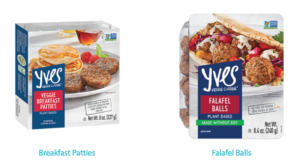
Yves is another popular option, offering sandwich meats, bacon, veggie dogs, and more. Just like any other brand, you should always read the ingredients before purchasing.
Fast Food Restaurants including Tim Hortons, Starbucks, A&W, Harvey’s, Five Guys, and Burger King have plant based meat options from breakfast sandwiches, to burgers, to nuggets. Click the links above to see what each restaurant offers. Many dine-in restaurants also carry many delicious vegetarian options nowadays such as Beertown and Moxie’s.
Key Summary Points
- Vegan meat has no cholesterol so it lowers the chance of heart disease
- Vegan meat is still processed food and has added flavouring (just like many other foods)
- Vegan meat has a smaller carbon footprint and is better for the environment than animal meat
- Vegan meat poses no harm to animals
- Vegan meat is not necessarily healthier than regular meat, but has its positives (no cholesterol, fibre from plants that meat does not have)
- The best way to reduce health risks, like heart disease, and have the smallest carbon footprint is to live mostly on a whole food, plant based diet. Although this is the truth, we realize this is very hard for most people, including ourselves, so all we can ask is that we all do what we can to reduce our negative environmental impact in places that each individual feels comfortable.
